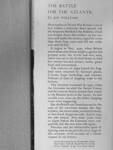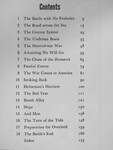1.067.327
kiadvánnyal nyújtjuk Magyarország legnagyobb antikvár könyv-kínálatát

VISSZA
A TETEJÉRE
JAVASLATOKÉszre-
vételek
The Battle for the Atlantic
| Kiadó: | Random House, Inc. |
|---|---|
| Kiadás helye: | New York |
| Kiadás éve: | |
| Kötés típusa: | Fűzött keménykötés |
| Oldalszám: | 178 oldal |
| Sorozatcím: | Landmark Books |
| Kötetszám: | 87 |
| Nyelv: | Angol |
| Méret: | 22 cm x 15 cm |
| ISBN: | |
| Megjegyzés: | Néhány fekete-fehér fotóval. |
naponta értesítjük a beérkező friss
kiadványokról
naponta értesítjük a beérkező friss
kiadványokról
Fülszöveg
THE BATTLE
FOR THE ATLANTIC
by JAY WILLIAMS
Most battles in World War II were won or lost within a relatively short period, but the desperate Battle for the Atlantic, which vvas fought above the surface, on the sur-face, and under the surface, raged for more than three long years and did not really end until D-Day.
It began in May, 1940, when Britain stood alone and almost helpless against the greatest army the world had ever seen, and it was up to the United States to send her sorely-needed planes, tanks, guns, food, and ammunition.
The convoys of ships bound for Eng-land were attacked by Germán planes, U-boats, huge battleships, and cruisers. Millions of tons of shipping went to the bottom.
The situation worsened in 1941, when the Germans invaded the Soviet Union, and the convoys had to extend their routes to the Russian ports in the Arctic. As that terrible year wore on, the Allies' shipping losses were staggering.
But the British and American navies, the men of the... Tovább
Fülszöveg
THE BATTLE
FOR THE ATLANTIC
by JAY WILLIAMS
Most battles in World War II were won or lost within a relatively short period, but the desperate Battle for the Atlantic, which vvas fought above the surface, on the sur-face, and under the surface, raged for more than three long years and did not really end until D-Day.
It began in May, 1940, when Britain stood alone and almost helpless against the greatest army the world had ever seen, and it was up to the United States to send her sorely-needed planes, tanks, guns, food, and ammunition.
The convoys of ships bound for Eng-land were attacked by Germán planes, U-boats, huge battleships, and cruisers. Millions of tons of shipping went to the bottom.
The situation worsened in 1941, when the Germans invaded the Soviet Union, and the convoys had to extend their routes to the Russian ports in the Arctic. As that terrible year wore on, the Allies' shipping losses were staggering.
But the British and American navies, the men of the merchant marine, the ship-builders, the escort units, worked tirelessly at their hard, dangerous jobs. And in 1943 the tide turnéd. Tvvo more years were to elapse before the Germans were van-quished, but the seas were safe again.
Heroism and the indomitable spirit of fíghting men at sea pervade everv page of this accurate, vivid account of a fateful chapter in our history.
Jacket illustration by Lt. Commander Anton Ottó Fisher, USCGR, World War II Combat Artist. Courtesy of the U.S. Coast Guard. Vissza
Témakörök
- Idegennyelv > Idegennyelvű könyvek > Angol > Műszaki
- Idegennyelv > Idegennyelvű könyvek > Angol > Történelem > USA története
- Történelem > Idegennyelvű > Angol
- Történelem > Kontinensek szerint > Amerika, amerikai országok története > Észak-Amerika
- Történelem > Legújabb kor > II. világháború > Hadtörténet
- Történelem > Hadtörténet > Háborúk, csaták
- Történelem > Hadtörténet > Fegyverek, fegyvernemek
- Műszaki > Idegennyelv > Angol
- Műszaki > Hadászat, hadtörténet
- Műszaki > Közlekedés > Hajózás > Folyami és tengeri hajózás
Jay Williams
Jay Williams műveinek az Antikvarium.hu-n kapható vagy előjegyezhető listáját itt tekintheti meg: Jay Williams könyvek, művekMegvásárolható példányok
Állapotfotók
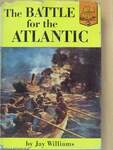
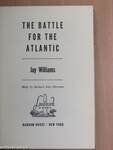
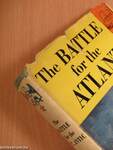

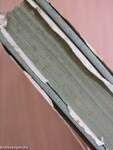
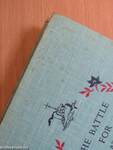

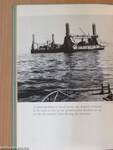
A védőborító szakadt, elszíneződött. A védőborító, a borító, néhány lap és a lapélek kissé foltosak. Az előzéklapon ceruzás ajándékozási bejegyzés, az előlapon beragasztott tulajdonosi címke és bejegyzés látható.
A felső lapélek színezettek.






